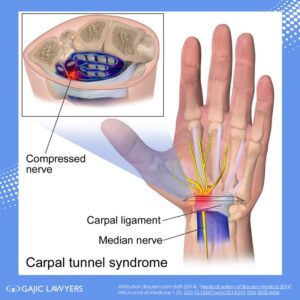If your job has caused or worsened your carpal tunnel syndrome, you may be entitled to workers’ compensation in New South Wales.
Our increasing reliance on technology has meant more time spent on the keyboard. With repetitive hand movements, the risk of developing carpal tunnel syndrome (CTS) increases, a disease that can be painful and interfere with work. But knowing your rights and understanding the claims process can help you secure the financial and medical support you need. However, strict time limits apply, so it’s crucial to act quickly.
Think your job might have caused or worsened your carpal tunnel syndrome? Talk to Gajic Lawyers now for a free, no-obligation consultation.
What is Carpal Tunnel Syndrome?
Carpal tunnel syndrome is a disorder that affects the nerves in the wrist and hand. This is caused by compression of the median nerve as it passes through a narrow passageway in the wrist called the carpal tunnel. This pressure can result in symptoms in the hand and fingers, including:
- numbness

- tingling
- weakness
- pain
In severe cases, it may lead to permanent nerve damage and loss of hand function, significantly impacting a person’s ability to work and perform daily tasks.
Prevalence of Carpal Tunnel Syndrome
Research shows that approximately 5% of the global population has CTS. In contrast, a 2009 study published in the Australian Family Physician estimates around 195,000 carpal tunnel syndrome-related doctor visits are made in Australia each year. However, this figure may have changed, given that of the 14 million employed in Australia, about 36% usually worked from home in 2024, according to the Australian Bureau of Statistics.
Can my work cause or worsen my carpal tunnel syndrome?
Carpal tunnel syndrome can develop gradually due to repetitive strain or be aggravated by workplace activities, including:
- Continuous typing or prolonged use of a keyboard and mouse
- Repetitive hand and wrist movements, common in factory work
- Operating vibrating tools, such as jackhammers or chainsaws
- Frequent heavy lifting or forceful gripping
- Poorly designed workstations and ergonomic setups
- Exposure to cold environments can tighten muscles and restrict blood flow
Over time, these factors can lead to chronic wrist pain, reduced grip strength, and even long-term disability if left untreated.
Who’s Most at Risk?
Certain workers face a higher risk of developing carpal tunnel syndrome due to the nature of their jobs. Some high-risk occupations include:
|
Occupation |
Work-related risk factor |
|
Office workers |
Prolonged typing and mouse usage |
|
Factory and assembly line workers |
Repetitive hand movements |
|
Construction workers |
Use of vibrating power tools |
| Healthcare professionals |
Tasks like administering injections and handling medical instruments |
| Retail employees |
Frequent use of barcode scanners and cash registers |
| Cleaners and hospitality workers |
Regular scrubbing, squeezing, and gripping tasks |
Other factors, such as underlying health conditions like diabetes, arthritis, or obesity, may also increase a worker’s susceptibility to carpal tunnel syndrome.
Treatment
Evidence-based treatments include (Sevy et al., 2023):
First steps:
- Wearing a wrist splint at night to keep your wrist straight
- Steroid injections into the wrist
- Quick relief but temporary
- Can be repeated every 6 months
If initial treatment doesn’t help:
- Combination of splinting and injections
- Short course of steroid tablets
- Hand therapy exercises and treatment
Surgery:
- Recommended if:
- Other treatments haven’t worked
- Nerve tests show severe problems
- Simple operation to relieve pressure on the nerve
- Usually day surgery
- Very successful in the short term
- About 60% remain improved after 5 years
NOTE: Common pain medications like ibuprofen aren’t proven to improve carpal tunnel syndrome.
Always see your GP for a proper diagnosis and treatment plan.
What compensation can I claim?
If your carpal tunnel syndrome is work-related, you may be eligible for various types of compensation, including:
- Weekly Payments: Financial support for lost wages if you’re unable to work or need to work reduced hours.
- Medical and Treatment Costs: Coverage for doctor visits, surgery, physiotherapy, medications, and ergonomic aids.
- Permanent Impairment Compensation: A lump sum payment if your condition results in a permanent impairment assessed at 11% or higher.
- Work Injury Damages: Additional compensation if employer negligence played a role in your condition.
Time Limits
In NSW, strict time limits apply to workers’ compensation claims:
- Notify your employer about your injury right away.
- Within six months of becoming aware of your injury to lodge a claim.
- Beyond six months if there is a valid reason for the delay, such as a late diagnosis or worsening symptoms.
- Within three years from the date of injury to lodge Work injury damages claims for negligence
Missing these deadlines may result in your claim being denied, so it’s essential to act quickly.
How to Lodge a Workers’ Compensation Claim
If you believe your carpal tunnel syndrome is work-related, follow these steps to strengthen your claim:
- Seek Medical Attention – Obtain a formal diagnosis from a doctor and request a Certificate of Capacity or Fitness.
- Report to Your Employer – Inform your employer about your condition as soon as possible.
- Keep Detailed Records – Maintain documentation of your symptoms, medical appointments, and how work tasks aggravate your condition.
- Lodge Your Claim – Submit a workers’ compensation claim through your employer’s insurer. The insurer must decide within 21 days.
Legal Challenges and Considerations
Workers’ compensation claims for carpal tunnel syndrome can be complicated, as the condition often develops over time. Some common challenges include:
- The need to prove that work activities were a significant contributing factor
- The presence of pre-existing conditions that may affect eligibility
- Disputes over medical assessments by insurers
If your claim is rejected, you can appeal the decision through the Personal Injury Commission.
When Should You Seek Legal Assistance?
It’s best to consult a seasoned Workers’ Compensation Lawyer, such as ours if you think you’ve developed carpal tunnel syndrome because of your work, or if:
- Your payments have been halted or decreased.
- The insurer disputes the work-related nature of your condition
- Your payments have been stopped or reduced
- You’re considering a negligence claim against your employer
Frequently Asked Questions (FAQs)
Can I claim compensation if I developed carpal tunnel syndrome after being sacked?
Yes, if your condition was caused by your previous job, you may still be eligible for workers’ compensation. You’ll need medical evidence linking your injury to your work.
Can I claim workers’ compensation for carpal tunnel syndrome if I work from home?
Yes. If your work-from-home duties involve repetitive hand and wrist movements that contributed to your condition, you may be eligible for compensation.
Can I sue my employer for carpal tunnel syndrome?
If your employer’s negligence contributed to your condition (e.g., lack of proper ergonomic equipment or failure to address workplace risks), you may be able to file a work injury damages claim.
Will I regain full use of my hands after carpal tunnel surgery?
Most people experience significant improvement after surgery, but recovery varies. Some may have temporary stiffness or weakness, while others regain full function with proper rehabilitation and physiotherapy.
Here to Assist
Don’t let carpal tunnel syndrome permanently affect your ability to work and enjoy life. If you’ve developed this condition through your employment, you have clear legal rights to compensation that can cover your medical expenses, lost wages, and potentially provide lump sum payments for permanent impairment.
Our Parramatta Workers Compensation Lawyers and Cabramatta Workers Compensation Lawyers are committed to helping you:
- Determine your eligibility for compensation
- Gather the necessary medical evidence
- Appeal denied claims
- Negotiate with insurers for the best possible outcome
But remember, strict time limits apply. Don’t hesitate to consult with us today.







